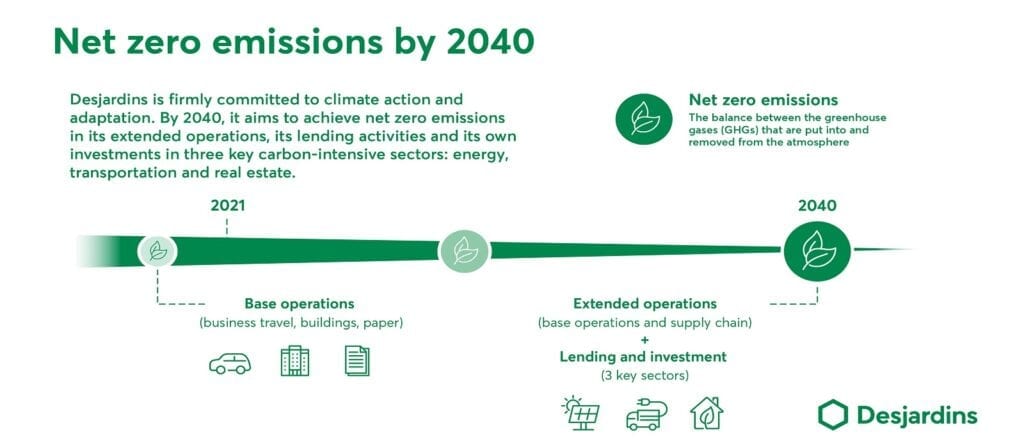Canadian ICMIF member Desjardins is helping make sustainable mobility solutions more accessible to its members, clients and employees by promoting initiatives like expanding its network of electric charging stations, rolling out bike repair stations across Quebec, implementing a mileage reimbursement policy for fuel-efficient cars and offering a selection of these cars in its vehicle fleet.
Desjardins’s climate action plan outlines its commitment to achieving net zero emissions by 2040 in its extended operations, its lending activities and its own investments in three key carbon-intensive sectors: energy, transportation and real estate. To achieve this, Desjardins has committed to supporting its members and clients in the energy transition and to reducing the carbon footprint of its own base operations.
“Climate change has major impacts on our society. At Desjardins, we’re doing more than ever to support initiatives that are part of the solution. That’s one way we can ensure the well-being of our communities, now and in the future. Among Canadian financial institutions, we want to be one that gives the most support to members, clients and employees as we make this transition. We’re in a good position to do this, because we’ve been recognised by Mediacorp as one of Canada’s Greenest Employers every year since 2015,” said Guy Cormier, President and CEO of Desjardins Group.
Electric charging station network
In partnership with AddÉnergie and Hydro-Québec, Desjardins has continued to install electric charging stations at caisse* and credit union locations across Quebec and eastern Ontario. To date, 302 charging stations have been installed, including 279 that are available to the general public. The goal is to build a network of 500 electric charging stations by 2025 for members, clients and communities in Quebec and eastern Ontario.
Bike repair stations
On 1 March 2022, a bike repair station programme was launched in the caisse network. To encourage people to cycle, the programme will be open to everyone. The goal this year is to install 50 repair stations across the network. Caisses can install the stations on site or at a partner organisation. The repair stations are made by a local Quebec company.
Vehicle fleet
Employees with a company car must choose a hybrid or electric model. Desjardins says it is pleased to offer employees greener transportation options. All vehicles purchased in the last year are low-emission vehicles. Desjardins General Insurance now has 474 vehicles across Canada, including 243 hybrid, plug-in hybrid and electric vehicles, representing 51% of the fleet.
Vehicle mileage reimbursement policy
This year, Desjardins updated its mileage reimbursement policy for essential business travel. The policy was revised to pay higher rates for fuel-efficient cars in line with greenhouse gas reduction targets.
There will be bigger reimbursements for employees who carpool, as well as employees with electric or hybrid vehicles.
Although some business travel is necessary, online meetings are still the preferred option when employees don’t need to be on site.
Desjardins also has a shuttle bus for employees travelling between its Lévis and Montreal sites.
* Desjardins Group is an organisation of caisses populaires and caisses d’économie (credit unions). The caisse populaire is a cooperative, the members of which are generally people living in a given geographical sector, such as the same town or neighbourhood. Most Quebecers are members of the Desjardins caisse that is closest to their home or workplace. The credit union is also a cooperative, like the caisse populaire. However, in the majority of cases, membership in a credit union is based on belonging to a certain profession or sharing a common workplace.






